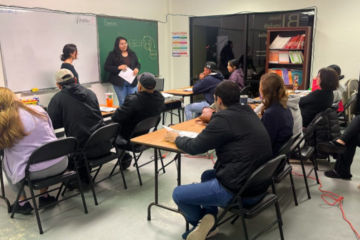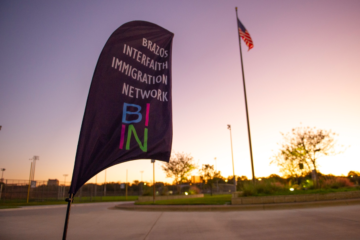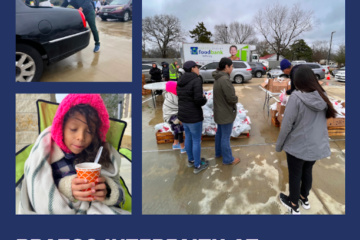The coronavirus pandemic has changed and complicated many things we once took for granted. For parents, helping children succeed in school is one of many daily tasks that the public health crisis has transformed. Whether children attend school in person or remotely, “school” these days often requires much more digital engagement: even if students attend classes in person, they may be expected to do or submit assignments online. Parents are also often expected to follow children’s progress and communicate with teachers and school personnel using email and various digital platforms, rather than in-person visits or conversations on the fly.
For families who do not have reliable access to broadband internet from home or digital devices for everyone who needs one, keeping up with the demands of school these days is quite challenging. And this is even more true when parents have limited digital skills as well as limited abilities in English. The pandemic has exposed the longstanding “digital divide,” a gap in opportunity and access that has significant consequences for how and what people learn and what they can do, as a result. Studies have shown that people in low-income communities of color, including immigrants, are disproportionately likely not to have reliable access to internet access and digital devices, and thus are less likely to be able to work remotely, to do school online, to access telehealth, etc.
Realizing what is at stake here, BIIN has created a new program for parents with limited English and digital literacy, who want to strengthen these skills so that they can better support their children’s education. The new online program, called “Aliados en Acción / Allies in Action,” is the fruit of a collaboration led by BIIN Intern Aileen Vital and staff member Janet Morford, along with a core group of bilingual and digitally-savvy volunteers, who helped launch a five-week pilot of the program in October 2020.
“Allies in Action” meets via Zoom on Wednesday afternoons. Each session is meant to increase participants’ familiarity and comfort with using digital tools, and to give them practice communicating in English, while accessing and using digital platforms that many schools now use to communicate with parents regarding grades, attendance, school meals, transportation, assignments and expectations of students.
While Aileen and Janet lead the whole group segments of each meeting (alternating between Spanish and English), a corps of multilingual volunteers provide one-on-one support as pairs move to “breakout rooms” (a feature of Zoom), where parent participants can practice specific skills, such as “sharing your screen” or responding to an online form, with help from their volunteer “allies.” Each session begins with icebreakers designed to build community and practice listening and speaking skills in English, and ends with a mindfulness exercise meant to provide a moment’s relief in a parent’s busy day.
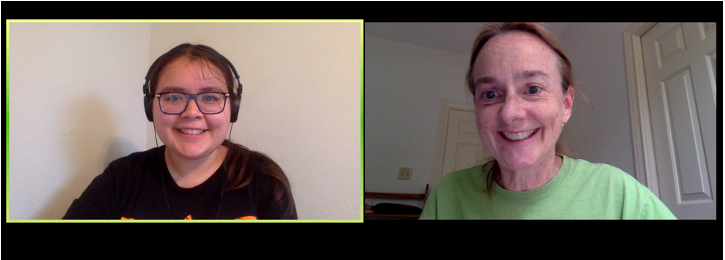
Aileen, a TAMU senior who is majoring in psychology and minoring in sociology, brings a wealth of experience and vital skills to the program. Prior to coming to BIIN, she worked with a couple of Houston-area programs that help youth from under-resourced communities as they prepare for higher education. Throughout her college years, Aileen has also been involved with youth ministries at St. Mary’s Catholic Church. These experiences have helped her develop an aptitude for leading group activities and building a sense of shared purpose. As a native Spanish speaker whose formal education has been predominantly in English, Aileen moves easily between the two languages.
Janet, a long-time educator who volunteered with English for Parents before joining the BIIN staff, appreciates Aileen’s “natural sense of pedagogy” and her skills in creating the PowerPoint slides that make it easier for all participants to engage fully in each session. “Not only are her slides perfectly bilingual,” she observed, “but they are beautifully designed and sequenced. When you are working with people who have different comfort levels in each language, it’s really helpful to have clear visual cues.” Janet also stressed how grateful she is to work with volunteers who have logged many hours as students on Zoom: “Our crew of volunteers is incredibly helpful, when it comes to finding solutions to technical glitches or thinking about ways to make sure we keep everyone engaged and connected. They are fun to work with and they bring so much to every session!”
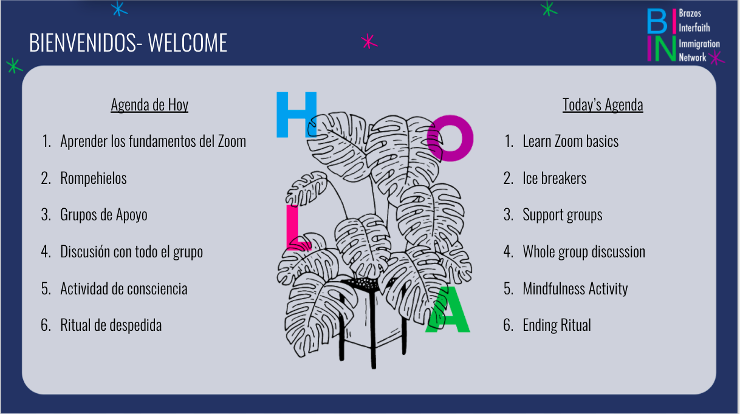
For many of the volunteers as well as Aileen, it is easy to connect with the families the new program is designed to serve. As the daughter of people who came to the U.S. from Mexico, Aileen sees clear parallels between the challenges her family faced as she grew up in Houston and the situations of immigrant families in the Brazos Valley: “I grew up in a Spanish-speaking home, and I saw my parents struggle when I was in school,” she recalls. “A majority of my teachers didn’t speak Spanish, and it was hard for my parents to communicate with them. In my senior year of high school, I was really struggling with college applications, and my parents didn’t know how to help me. Instead, I had to help them – I had to create an email for my parents, so they could get information about FAFSA (so I could get financial aid for college).”
With the rapid and on-going proliferation of digital technologies and tools, it can be hard for people who are older or who are not involved daily with technology through work or education to expand their skills in this area. Allies in Action represents one way to strengthen parents’ skills and confidence about their own ability to learn to use new tools, and to continue to play a vital role in their children’s education. “I’m really excited to work with parents through BIIN,” Aileen said. “I hope with this program, we can help parents, so they can more easily help their children.”
In its pilot phase, Allies in Action will be meeting on Wednesdays through November 18. Like other BIIN programs that depend on volunteers associated with Texas A&M and other area colleges, the program will take a break over the winter holidays, and plan to resume in January. For more information about the program or to volunteer, anyone interested can reach out by email at aileen@brazosimmigration.com and/or janet@brazosimmigration.com or leave a voicemail at BIIN’s office, (979) 393-8228.
The National Digital Inclusion Alliance provides guidance for organizations like BIIN that are working to expand digital skills and access to technology among people in their community (click on image for bigger image).

